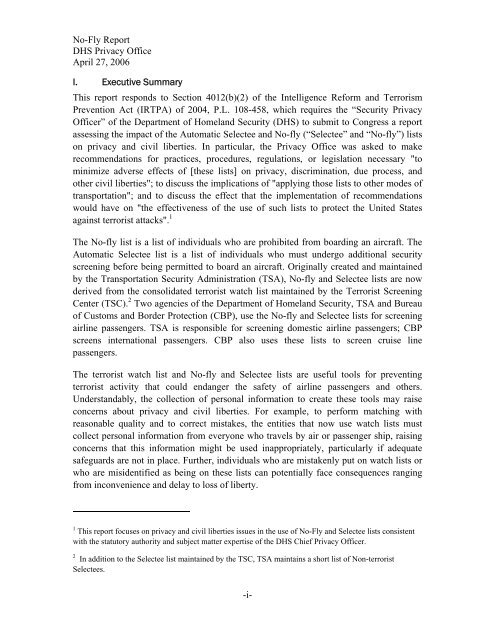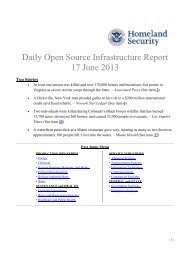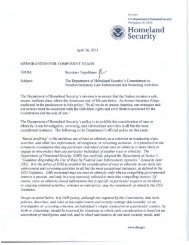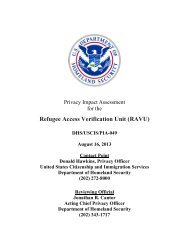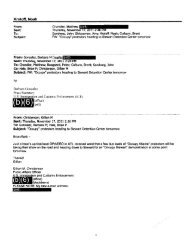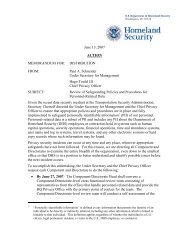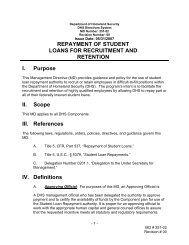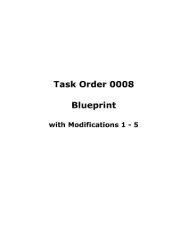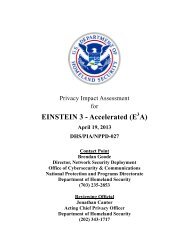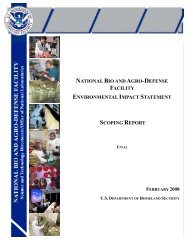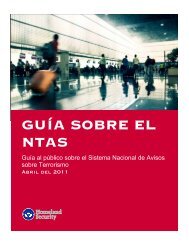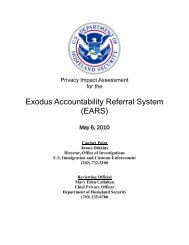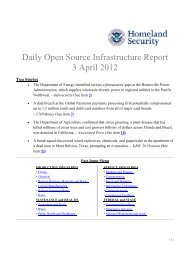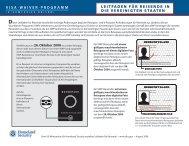Report: No Fly - Homeland Security
Report: No Fly - Homeland Security
Report: No Fly - Homeland Security
You also want an ePaper? Increase the reach of your titles
YUMPU automatically turns print PDFs into web optimized ePapers that Google loves.
<strong>No</strong>-<strong>Fly</strong> <strong>Report</strong><br />
DHS Privacy Office<br />
April 27, 2006<br />
I. Executive Summary<br />
This report responds to Section 4012(b)(2) of the Intelligence Reform and Terrorism<br />
Prevention Act (IRTPA) of 2004, P.L. 108-458, which requires the “<strong>Security</strong> Privacy<br />
Officer” of the Department of <strong>Homeland</strong> <strong>Security</strong> (DHS) to submit to Congress a report<br />
assessing the impact of the Automatic Selectee and <strong>No</strong>-fly (“Selectee” and “<strong>No</strong>-fly”) lists<br />
on privacy and civil liberties. In particular, the Privacy Office was asked to make<br />
recommendations for practices, procedures, regulations, or legislation necessary "to<br />
minimize adverse effects of [these lists] on privacy, discrimination, due process, and<br />
other civil liberties"; to discuss the implications of "applying those lists to other modes of<br />
transportation"; and to discuss the effect that the implementation of recommendations<br />
would have on "the effectiveness of the use of such lists to protect the United States<br />
against terrorist attacks". 1<br />
The <strong>No</strong>-fly list is a list of individuals who are prohibited from boarding an aircraft. The<br />
Automatic Selectee list is a list of individuals who must undergo additional security<br />
screening before being permitted to board an aircraft. Originally created and maintained<br />
by the Transportation <strong>Security</strong> Administration (TSA), <strong>No</strong>-fly and Selectee lists are now<br />
derived from the consolidated terrorist watch list maintained by the Terrorist Screening<br />
Center (TSC). 2 Two agencies of the Department of <strong>Homeland</strong> <strong>Security</strong>, TSA and Bureau<br />
of Customs and Border Protection (CBP), use the <strong>No</strong>-fly and Selectee lists for screening<br />
airline passengers. TSA is responsible for screening domestic airline passengers; CBP<br />
screens international passengers. CBP also uses these lists to screen cruise line<br />
passengers.<br />
The terrorist watch list and <strong>No</strong>-fly and Selectee lists are useful tools for preventing<br />
terrorist activity that could endanger the safety of airline passengers and others.<br />
Understandably, the collection of personal information to create these tools may raise<br />
concerns about privacy and civil liberties. For example, to perform matching with<br />
reasonable quality and to correct mistakes, the entities that now use watch lists must<br />
collect personal information from everyone who travels by air or passenger ship, raising<br />
concerns that this information might be used inappropriately, particularly if adequate<br />
safeguards are not in place. Further, individuals who are mistakenly put on watch lists or<br />
who are misidentified as being on these lists can potentially face consequences ranging<br />
from inconvenience and delay to loss of liberty.<br />
1 This report focuses on privacy and civil liberties issues in the use of <strong>No</strong>-<strong>Fly</strong> and Selectee lists consistent<br />
with the statutory authority and subject matter expertise of the DHS Chief Privacy Officer.<br />
2 In addition to the Selectee list maintained by the TSC, TSA maintains a short list of <strong>No</strong>n-terrorist<br />
Selectees.<br />
-i-


